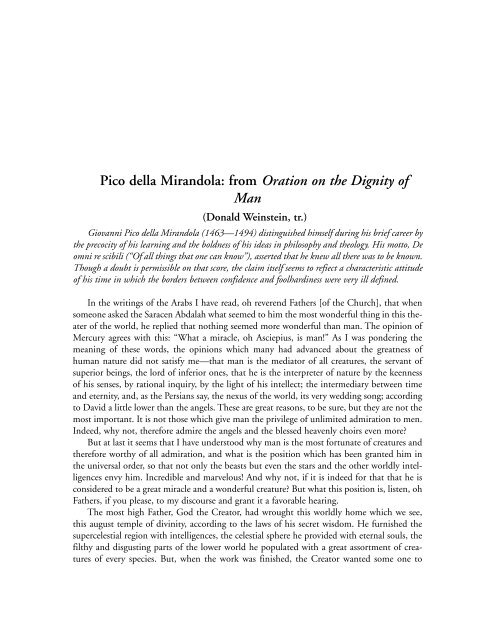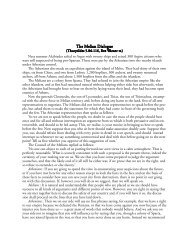Pico della Mirandola: from Oration on the Dignity of Man
Pico della Mirandola: from Oration on the Dignity of Man
Pico della Mirandola: from Oration on the Dignity of Man
Create successful ePaper yourself
Turn your PDF publications into a flip-book with our unique Google optimized e-Paper software.
<str<strong>on</strong>g>Pico</str<strong>on</strong>g> <str<strong>on</strong>g>della</str<strong>on</strong>g> <str<strong>on</strong>g>Mirandola</str<strong>on</strong>g>: <str<strong>on</strong>g>from</str<strong>on</strong>g> <str<strong>on</strong>g>Orati<strong>on</strong></str<strong>on</strong>g> <strong>on</strong> <strong>the</strong> <strong>Dignity</strong> <strong>of</strong><strong>Man</strong>(D<strong>on</strong>ald Weinstein, tr.)Giovanni <str<strong>on</strong>g>Pico</str<strong>on</strong>g> <str<strong>on</strong>g>della</str<strong>on</strong>g> <str<strong>on</strong>g>Mirandola</str<strong>on</strong>g> (1463—1494) distinguished himself during his brief career by<strong>the</strong> precocity <strong>of</strong> his learning and <strong>the</strong> boldness <strong>of</strong> his ideas in philosophy and <strong>the</strong>ology. His motto, Deomni re scibili (“Of all things that <strong>on</strong>e can know”), asserted that he knew all <strong>the</strong>re was to be known.Though a doubt is permissible <strong>on</strong> that score, <strong>the</strong> claim itself seems to refiect a characteristic attitude<strong>of</strong> his time in which <strong>the</strong> borders between c<strong>on</strong>fidence and foolhardiness were very ill defined.In <strong>the</strong> writings <strong>of</strong> <strong>the</strong> Arabs I have read, oh reverend Fa<strong>the</strong>rs [<strong>of</strong> <strong>the</strong> Church], that whensome<strong>on</strong>e asked <strong>the</strong> Saracen Abdalah what seemed to him <strong>the</strong> most w<strong>on</strong>derful thing in this <strong>the</strong>ater<strong>of</strong> <strong>the</strong> world, he replied that nothing seemed more w<strong>on</strong>derful than man. The opini<strong>on</strong> <strong>of</strong>Mercury agrees with this: “What a miracle, oh Asciepius, is man!” As I was p<strong>on</strong>dering <strong>the</strong>meaning <strong>of</strong> <strong>the</strong>se words, <strong>the</strong> opini<strong>on</strong>s which many had advanced about <strong>the</strong> greatness <strong>of</strong>human nature did not satisfy me—that man is <strong>the</strong> mediator <strong>of</strong> all creatures, <strong>the</strong> servant <strong>of</strong>superior beings, <strong>the</strong> lord <strong>of</strong> inferior <strong>on</strong>es, that he is <strong>the</strong> interpreter <strong>of</strong> nature by <strong>the</strong> keenness<strong>of</strong> his senses, by rati<strong>on</strong>al inquiry, by <strong>the</strong> light <strong>of</strong> his intellect; <strong>the</strong> intermediary between timeand eternity, and, as <strong>the</strong> Persians say, <strong>the</strong> nexus <strong>of</strong> <strong>the</strong> world, its very wedding s<strong>on</strong>g; accordingto David a little lower than <strong>the</strong> angels. These are great reas<strong>on</strong>s, to be sure, but <strong>the</strong>y are not <strong>the</strong>most important. It is not those which give man <strong>the</strong> privilege <strong>of</strong> unlimited admirati<strong>on</strong> to men.Indeed, why not, <strong>the</strong>refore admire <strong>the</strong> angels and <strong>the</strong> blessed heavenly choirs even more?But at last it seems that I have understood why man is <strong>the</strong> most fortunate <strong>of</strong> creatures and<strong>the</strong>refore worthy <strong>of</strong> all admirati<strong>on</strong>, and what is <strong>the</strong> positi<strong>on</strong> which has been granted him in<strong>the</strong> universal order, so that not <strong>on</strong>ly <strong>the</strong> beasts but even <strong>the</strong> stars and <strong>the</strong> o<strong>the</strong>r worldly intelligencesenvy him. Incredible and marvelous! And why not, if it is indeed for that that he isc<strong>on</strong>sidered to be a great miracle and a w<strong>on</strong>derful creature? But what this positi<strong>on</strong> is, listen, ohFa<strong>the</strong>rs, if you please, to my discourse and grant it a favorable hearing.The most high Fa<strong>the</strong>r, God <strong>the</strong> Creator, had wrought this worldly home which we see,this august temple <strong>of</strong> divinity, according to <strong>the</strong> laws <strong>of</strong> his secret wisdom. He furnished <strong>the</strong>supercelestial regi<strong>on</strong> with intelligences, <strong>the</strong> celestial sphere he provided with eternal souls, <strong>the</strong>filthy and disgusting parts <strong>of</strong> <strong>the</strong> lower world he populated with a great assortment <strong>of</strong> creatures<strong>of</strong> every species. But, when <strong>the</strong> work was finished, <strong>the</strong> Creator wanted some <strong>on</strong>e to
<str<strong>on</strong>g>Orati<strong>on</strong></str<strong>on</strong>g> <strong>on</strong> <strong>the</strong> <strong>Dignity</strong> <strong>of</strong> <strong>Man</strong> 2refiect up<strong>on</strong> <strong>the</strong> reas<strong>on</strong> behind such a great creati<strong>on</strong>, who might love its beauty and marvelover its grandeur. And <strong>the</strong>refore, when everything was finished, as Moses and Timaeus attest,he thought at last <strong>of</strong> creating man. However, <strong>the</strong>re was not <strong>on</strong>e model left by which he mightfashi<strong>on</strong> a new <strong>of</strong>fspring; <strong>the</strong>re was nothing left in <strong>the</strong> treasury with which he could endow thisnew s<strong>on</strong>. There was no stati<strong>on</strong> in all <strong>the</strong> world where this c<strong>on</strong>templator <strong>of</strong> <strong>the</strong> universe couldsit. All were full; everything had been distributed to <strong>the</strong> highest, <strong>the</strong> middle and <strong>the</strong> lowestorders. But it was not fitting <strong>of</strong> <strong>the</strong> paternal power to have been worn out in <strong>the</strong> last act <strong>of</strong>creati<strong>on</strong>. It was not worthy <strong>of</strong> his wisdom to have been left perplexed over an important problem.Nor was it fitting to his provident love that <strong>the</strong> creature who was to have praised hisdivine liberality to o<strong>the</strong>rs was compelled to complain <strong>of</strong> <strong>the</strong> lack <strong>of</strong> it to himself. At last thatexcellent creator decided that he to whom he was to give nothing for his own could shareeverything which had been given individually to <strong>the</strong> o<strong>the</strong>rs. Thus he took man as <strong>the</strong> product<strong>of</strong> an undetermined nature and placed him in <strong>the</strong> middle <strong>of</strong> <strong>the</strong> world and said to him: “I havenot given you, oh Adam, a definite seat or a special appearance, or any functi<strong>on</strong> <strong>of</strong> your own.The seat or <strong>the</strong> appearance or <strong>the</strong> functi<strong>on</strong> which you want, you may have and keep by yourown desire and your own counsel.“The o<strong>the</strong>r creatures have a defined nature which is fixed within limits prescribed by me.You, unhampered, may determine your own limits according to your own will, into whosepower I have placed you. I have set you in <strong>the</strong> center <strong>of</strong> <strong>the</strong> world; <str<strong>on</strong>g>from</str<strong>on</strong>g> <strong>the</strong>re you can bettersee whatever is in <strong>the</strong> world. I have made you nei<strong>the</strong>r heavenly nor terrestrial, nei<strong>the</strong>r mortalnor immortal, in order that, like a free and sovereign artificer, you can fashi<strong>on</strong> your own formout <strong>of</strong> your own substance. You can degenerate to <strong>the</strong> lower orders <strong>of</strong> <strong>the</strong> brutes; you can,according to your own will, recreate yourself in those higher creatures which are divine.”Oh supreme generosity <strong>of</strong> God <strong>the</strong> Fa<strong>the</strong>r! Oh supreme and w<strong>on</strong>derful felicity <strong>of</strong> man, towhom it is granted to have what he desires, to be what he wishes! The brutes receive all that<strong>the</strong>y have <str<strong>on</strong>g>from</str<strong>on</strong>g> <strong>the</strong>ir mo<strong>the</strong>r’s womb when <strong>the</strong>y are born, as Lucullus says. The supreme spiritsbecome ei<strong>the</strong>r immediately or so<strong>on</strong> afterward that which <strong>the</strong>y were destined to be for alleternity. At <strong>the</strong> time <strong>of</strong> man’s birth <strong>the</strong> Fa<strong>the</strong>r plants every kind <strong>of</strong> seed and <strong>the</strong> germs <strong>of</strong> everykind <strong>of</strong> existence; and <strong>the</strong> <strong>on</strong>es which each man cultivates are <strong>the</strong> <strong>on</strong>es which will grow, and<strong>the</strong>y will bear <strong>the</strong>ir fruit in him. If <strong>the</strong>y are vegetative, he will be a plant; if animal, he will bea brute; if <strong>the</strong>y are rati<strong>on</strong>al, he will become a celestial creature; if intellectual, he will be anangel and <strong>the</strong> s<strong>on</strong> <strong>of</strong> God. But if, not c<strong>on</strong>tent with <strong>the</strong> lot <strong>of</strong> any kind <strong>of</strong> creature, he drawsinto <strong>the</strong> center <strong>of</strong> his own unity, his spirit will become <strong>on</strong>e with God. In <strong>the</strong> solitary darkness<strong>of</strong> <strong>the</strong> Fa<strong>the</strong>r he who has been set above all things will stand above all things. Who will notadmire our chamele<strong>on</strong>? Or ra<strong>the</strong>r, who will admire anything more? Of him Asclepius <strong>the</strong>A<strong>the</strong>nian said, with justice, that, in religious rites, because <strong>of</strong> his versatility and his changeablenature, he symbolized Proteus. Hence those famous metamorphoses am<strong>on</strong>g <strong>the</strong> Hebrews and<strong>the</strong> Pythagoreans. In fact, <strong>the</strong> esoteric <strong>the</strong>ology <strong>of</strong> <strong>the</strong> Jews at <strong>on</strong>e moment transforms St.Enoch into an angel <strong>of</strong> divinity. Then, o<strong>the</strong>rs into o<strong>the</strong>r divine spirits. The Pythagoreanschanged wicked men into beasts and (if Empedocles is to be believed) even into plants. In imitati<strong>on</strong><strong>of</strong> that Mahomet frequently repeated, and rightly, that he who retreated <str<strong>on</strong>g>from</str<strong>on</strong>g> <strong>the</strong> sacredlaw became a brute. For it is not <strong>the</strong> bark which makes <strong>the</strong> tree but <strong>the</strong> stupid and insensitive
<str<strong>on</strong>g>Orati<strong>on</strong></str<strong>on</strong>g> <strong>on</strong> <strong>the</strong> <strong>Dignity</strong> <strong>of</strong> <strong>Man</strong> 3nature; not <strong>the</strong> hide which makes <strong>the</strong> mule but <strong>the</strong> brutish and sensual soul. It is not separati<strong>on</strong><str<strong>on</strong>g>from</str<strong>on</strong>g> <strong>the</strong> body that makes an angel, but spiritual intelligence. If you see some<strong>on</strong>e who isa slave <strong>of</strong> his stomach, crawling <strong>on</strong> <strong>the</strong> ground, it is a plant that you see, not a man. If you seesome<strong>on</strong>e blinded like Callypso by vain illusi<strong>on</strong>s <strong>of</strong> fantasy and empris<strong>on</strong>ed by dark allurements,<strong>the</strong> slave <strong>of</strong> his senses, he is a brute, not a man. If he is a philosopher who looks ateverything with reas<strong>on</strong>, you will revere him: he is a heavenly creature, not an earthbound <strong>on</strong>e.If he is a pure c<strong>on</strong>templative, unaware <strong>of</strong> his body, given over to mental percepti<strong>on</strong>s, he is notan earthly nor a celestial creature, he is a more exalted spirit, surrounded by human fiesh. Andwho would not admire <strong>the</strong> man who in <strong>the</strong> Old and New Testament is called, and rightly, firstwith <strong>the</strong> name <strong>of</strong> all fiesh, <strong>the</strong>n with <strong>the</strong> name <strong>of</strong> every creature, because he shapes, creates,and transforms himself into <strong>the</strong> appearance <strong>of</strong> every kind <strong>of</strong> fiesh and into <strong>the</strong> nature <strong>of</strong> everykind <strong>of</strong> creature. So <strong>the</strong> Persian, Evantes writes, where he explains Chaldaean <strong>the</strong>ology, thatman does not have any image <strong>of</strong> his very own but many exterior and foreign <strong>on</strong>es. Hence <strong>the</strong>saying <strong>of</strong> <strong>the</strong> Chaldeans that man is an animal <strong>of</strong> varying nature, multiform and inc<strong>on</strong>stant.What <strong>of</strong> all this? It is that we may understand that <str<strong>on</strong>g>from</str<strong>on</strong>g> <strong>the</strong> time that we are born in this c<strong>on</strong>diti<strong>on</strong>we are what we wish to be. We should take care that it be not said <strong>of</strong> us that, being h<strong>on</strong>ored,we did not realize we have become similar to brutes and foolish jackasses. Let ra<strong>the</strong>r <strong>the</strong>words <strong>of</strong> Asaph be repeated: ““You are Gods, and you are all children <strong>of</strong> heaven,” lest, abusing<strong>the</strong> indulgent generosity <strong>of</strong> <strong>the</strong> Fa<strong>the</strong>r, we render harmful ra<strong>the</strong>r than salutary that choiceliberty which he has given us. Let a sacred ambiti<strong>on</strong> enter our souls so that we do not satisfyourselves with mediocre things, but aspire to <strong>the</strong> highest things, and strive with all ourstrength to reach <strong>the</strong>m. From <strong>the</strong> moment that we wish it, we can. Let us despise earthlyobjects, let us disdain celestial <strong>on</strong>es, and leaving aside whatever is worldly, let us soar to thatsupramundane court which is close to <strong>the</strong> most high divinity. There, according to <strong>the</strong> sacredmysteries,<strong>the</strong> Seraphim, Cherubim, and Thr<strong>on</strong>es have <strong>the</strong> primacy. Unable to give up, andimpatient <strong>of</strong> sec<strong>on</strong>d place, let us emulate <strong>the</strong>ir dignity and glory and, if we desire it, we shallbe in no way inferior to <strong>the</strong>m.



